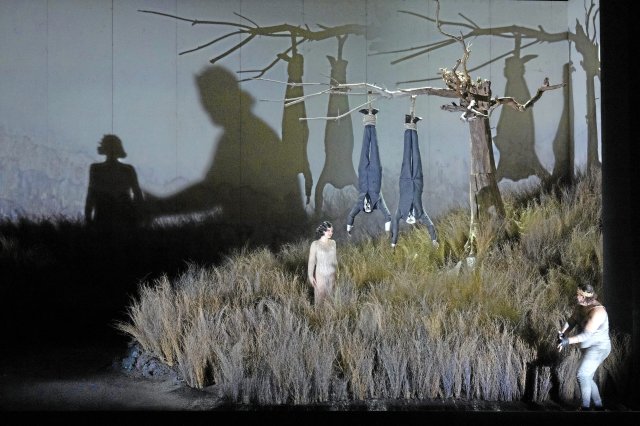Are these diverse moods a dream or not?
Photo: Monika Rittershaus
The tragic stage figure par excellence is the king, and not because he is necessarily a more valuable person. But because he is high up, he can fall even lower. Above all: Because he is powerful, he can and must make decisions. This applies to drama, and it also applies to musical theater.
Of course, King Dodon, the main character of Nikolai Rimsky-Korsakov’s last opera, only represents power in the state of extreme decline. Already at his first appearance he complains: He used to like to invade other countries. Now that he just wants to sleep, the enemy armies won’t let him rest. His two sons give stupid advice; When they later stab each other on the battlefield, not even her father feels much regret. He would rather be charmed by an oriental queen. She makes no effort to hide the fact that her interest lies not in the clumsy old man, but in power.
Rimsky-Korsakov composed the opera after the Russian Revolution of 1905, which had failed but weakened the Tsardom. Since he did not accept any compromises with the censors, it was not until 1909, the year after his death, that the premiere was abridged. The work was then heard in its entirety in Paris in 1914. The lyrics undermine the genre: the army sings about how it prefers to shoot at the enemy from a safe distance. When the king is dead at the end, the prescribed mourning is very distant. On the other hand, there are orientalizing sounds that stood for the foreign and erotic in Russian music of the 19th century. But here the exoticism is just calculation, and the sensual, foreign ruler is not only more beautiful, but above all smarter.
It is an opera with almost no popular appeal. But why the title? Because there are fairytale elements. An astrologer devoted to royalty gives Dodon a golden rooster that indicates whether the ruler can sleep peacefully or must fight. Later, the king kills the loyal subject, and the rooster takes revenge. This can be interpreted politically: the connection between myth and rule is breaking. But it also aims at stage effectiveness; Rimsky-Korsakov used fairy tale motifs effectively in several operas.
Such spectacles are a delight for a director like Barrie Kosky, and once again he can be said to have delivered a colorful and entertaining work at the Komische Oper in Berlin. At least it’s commendable that he doesn’t provide any updates and we don’t have to see Putin, who ends up getting chopped up by the golden rooster at the end of a very long table. However, the decision to stage the event as Dodon’s dream is questionable. Where actions are not taken consciously, there is no targeted course, no decision, and therefore no responsibility. You see this idea on the stage more often these days, and you can say that it corresponds to a society in decline where no one wants to have been. But it is precisely here that one should ask about responsibility.
Going into the dream simply turns political conflicts into individual obsessions. This is most evident in the climax of the seduction scene. The Oriental Queen orders Dodon to dance to her, knowing full well how embarrassing the sight will be. You see nothing more than an individual sado-maso story. And does the king even have to appear in stained underwear from the start? The argument is dramatic: if you start low, you can no longer fall.
If you ignore these basic objections and some of the unnecessary slapstick (Dodon’s army with suspenders), there are still many successful, often darkly humorous details. The stage design by Rufus Didwiszus simply shows a field path with tall grass and a bare tree on which the rooster will take his place and on which the dead king’s sons will hang decoratively. This is a simple solution that can be used in a variety of ways and, thanks to Franck Evin’s lighting direction, also conveys a variety of music-oriented moods.
The orchestra of the Komische Oper under James Gaffigan illustrates why Rimsky-Korsakov, as an instrumentator, became a role model for many composers, including Stravinsky. The powerful parts work better than the orientalizing, flattering ones – possibly due to the acoustics in the Schiller Theater, the alternative location while the Komische Oper is being renovated. But perhaps this is also a concept. Kseniia Proshina gives the Queen of Shemachar a very understated sensuality. So much of it isn’t necessary with the idiot Dodon, who immediately falls for her. Clear articulation, bright tones, and hardly any softness: everyone, except those in love, immediately notices that it’s about power.
The anchor of the production is Dmitry Ulyanov as the depraved king. He is almost always on stage during the two hours without a break that this performance lasts. For moments, this depraved character becomes almost sympathetic. As long as he is sluggish, at least he won’t wage war. He talks shamelessly, but you can call it honest. Ulyanov finds vocal facets for all of this, and he is also a gifted singer-actor. So the external conflict, which the director may not know anything about, plays out as a fight between Dodon and Dodon. In terms of content, this remains a reduced form of the work, but it is effective in terms of music theater; therefore great premiere cheers.
Next performances: February 7th, March 2nd, March 7th Comic Opera, Berlin
#ndstays – Get active and order a promotional package

Regardless of whether it is pubs, cafés, festivals or other meeting places – we want to become more visible and reach everyone who values independent journalism with an attitude. We have put together a campaign package with stickers, flyers, posters and buttons that you can use to get active and support your newspaper.
To the promotional package
judi bola judi bola judi bola link sbobet
